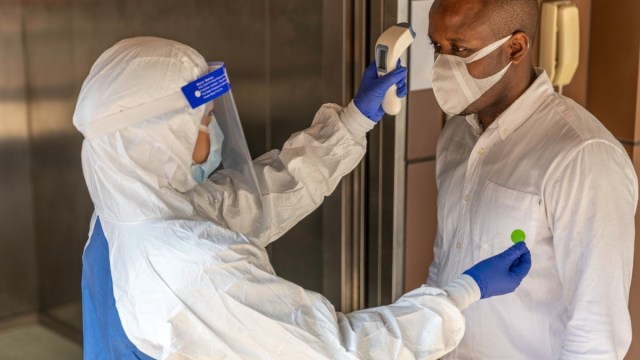Over the last 11 months, researchers have been struggling to identify what types of people should be considered high risk in regards to COVID-19. It has become increasingly clear that specific groups of people are more prone to initial infection, severity of infection, and even death. In a new Q&A with The Highlands Current,
Dr. Anthony Fauci, the nation’s leading infectious disease expert and director of the National Institutes of Health offers a run-down of all the characteristics of someone who is at a higher risk of coronavirus. Read on, and to ensure your health and the health of others, don’t miss these Sure Signs You’ve Already Had Coronavirus.
Dr. Fauci Says Race Plays a Big Part
According to Dr. Fauci, while there are a variety of factors that can make someone more susceptible to the virus, responsible for the deaths of over 252,000 Americans, race plays a big part in it.
“With health disparities, we have a situation among minority populations, particularly African American and Latino, because they are suffering more than three times as many deaths,” Fauci pointed out.
“In part, that’s due to the reality that people of color are more likely to be in face-to-face jobs with others, so their chances of getting infected are far greater than for you and I, sitting in front of a computer, safely talking to each other.”
People of color are also more prone to suffer from pre-existing conditions, per Dr. Fauci. “The other thing is that underlying comorbidities, namely diabetes, obesity, high blood pressure, chronic lung disease, kidney disease, put them at a significantly higher risk of not only hospitalization but death,” he said.
“That is not a racial issue — that is a social determinants issue. That goes back from the time you were born, the environment in which you grew up, the diet you were exposed to. That leads to the kinds of diseases that we’re seeing as comorbidities.”
He pointed out that these simple truths should be eye-opening in terms of healthcare, inspiring the system to take action. “If anything comes out of this, when we get out of this, it should be a firm, decade-long commitment to doing something about the social determinants of health,” he explained. “Because if we don’t, they’re not going to spontaneously go away. And the next time we have an outbreak, it’s going to be the same thing.
How to Survive This Pandemic
No matter your age, race or where you live, do everything you can to prevent getting—and spreading—COVID-19 in the first place: The nation’s top infectious disease expert Dr. Anthony Fauci strongly recommends to wear your face mask and avoid crowds, social distance, only run essential errands, wash your hands frequently, and to get through this pandemic at your healthiest, don’t miss these 35 Places You’re Most Likely to Catch COVID.



